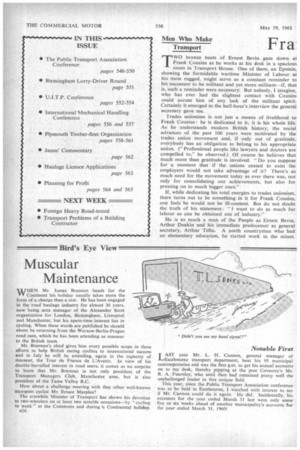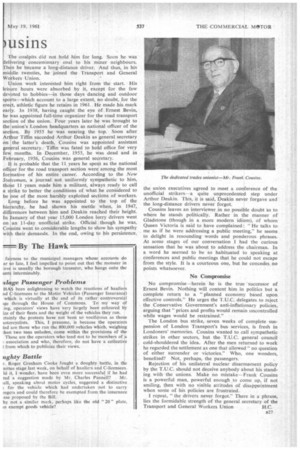Muscular Maintenance
Page 32

Page 33

If you've noticed an error in this article please click here to report it so we can fix it.
WHEN Mr. James Brannan • heads for the Continent his holiday usually takes more the form of a change than a rest. He has been engaged in the road haulage industry for almost 30 years, now being area manager of the Alexander Scott organization for London, Birmingham, Liverpool and Manchester, but his spare-time interest lies in cycling. When these words are published he should about be returning from the Warsaw-Berlin-Prague road race, which he has been attending as masseur to the British team.
Mr. Brannan's chief gives him every possible scope in these efforts to help British racing cyclists to international success and in July he will be attending, again in the capacity of masseur, the Tour de France de L'Avenir. In view of his double-barrelled interest in road users, it comes as no surprise to learn that Mr. Brannan is not only president of the Transport Managers Club, Manchester area, but is also president of the Tame Valley R.C.
Flow about a challenge meeting with that other well-known transport cyclist Mr. Ernest Marples?
The erstwhile Minister of Transport has shown his devotion to two-wheelers on at least two notable occasions—by "cycling to work" at the Commons and during Ja Continental holiday.
1326
Notable First
T AST year Mr. L. H. Cannon, general manager of -1–Eastbourne transport department, beat his 95 municipal contemporaries and was the first g.m. to get his annual accounts on to my desk, thereby pipping at the post Coventry's Mr. R. A. Fearnley, who until then had remained pretty well the unchallenged leader in this unique field.
This year, since the Public Transport Association conference was to be held in Eastbourne, I watched with interest to see if Mr. Cannon could do it again. He did. Incidentally, his accounts for the year ended March 31 last were only some five or six weeks ahead of another municipality's accounts for the year ended March 31, 1960!
fa mess to the municipal managers whose accounts do ar o late, I feel impelled to point out that the monster in :ay is usually the borough treasurer, who hangs onto the not interminably.
ge Passenger Problems
H S been enlightening to watch the reactions of hauliers nd -licensees to the Motor Vehicles (Passenger Insurance) wl4ch is virtually at the end of its rather controversial ige through the House of Commons. To my way of ing, operators' views have very largely been coloured by i.ze of their fleets and the weight of the vehicles they run. rtainly the protests have not been so vociferous as those iotorcyclists. This, I presume, is because the operators ted are those who run the 800,000 vehicles which, weighing than two tons unladen, come within the provisions of the These are the operators who tend not to be members of a t association and who, therefore, do not have a collective t from which to publicize their views.
ughty Battle
r. Roger Gresham Cooke fought a doughty battle, in the Mace stage last week, on behalf of hauliers and C-licensees. Id it, I wonder, have been even more successful if he had ted a suggestion made by Mr. Charles Pannell? Mr. tell, speaking about motor cycles, suggested a distinctive : for the vehicle which had undertaken not to carry !ngers and could therefore be exempted from the insurance ase proposed by the Bill.
by not a similar mark, perhaps like the old "20" plate, in exempt goods vehicle?




























































































































